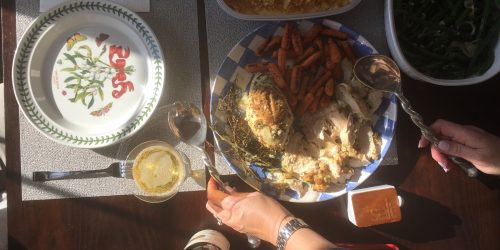
In every phase of life, my dedication for food as a love language has only increased.
Jesus ate with sinners and social outcasts like tax collectors (Matthew 9:9-13; Mark 2:13-17). He used the loaves and fishes to feed the followers as a sign of provision (Matthew 14). Christ gave his disciples a glimpse of what was to come over the last supper (Luke 22:7-38), and later ate with them after his resurrection (Luke 24:13-48). The messiah even referred to himself as the bread of life (John 6:35). These are just a few of the endless examples of where people came to Christ and left spiritually and physically fed.
I was raised with food as a love language. My Abuela served flan and arroz congri as a love that could be consumed. My Opa opened papaya, jackfruit, and watermelon for his granddaughters. I watched Food Network at an age when others gravitated to Nickelodeon and Cartoon Network, with works like “emulsify”, “caramelized” and “braised” dominating my lexicon. I checked out every Gourmet and Bon Appetit magazine from my local library, consuming the words of Barbara Fairchild with the same fervor that I wanted to consume the heirloom tomato carpaccio she described.

In every phase of life, my dedication for food as a love language has only increased. I know my limitations. I know that as much as I love baking and cooking, I could never be a professional chef. I move painfully slow, my timing is atrocious (everybody whose forgotten to preheat the oven or defrost the chicken, raise your hand) and I sometimes view baking instructions the same way my dad views yellow lights: mere suggestions. In spite of this, I still love it. I see it as my chance to relax, reconnect, and recharge; most satisfying of all is when I get to feed others. My first week in college I made breakfast for a sabbath school class of 40 people. The week after I make pumpkin muffins for a charity bake sale. My friends and I crowded around the lobby table on sabbath afternoons to eat together more times than I can count. I fed a friend after she suffered devastating pain. I made glazed brussel sprouts at 3am as rest after studying. I cooked enough garlicky white beans in the month my parents suffered from Covid to choke a horse.
Food has been the foundation of my community, the active dedication in my friendships, my sanity in college, and my escape during quarantine. Laced within all of it, the act of cooking has been seasoned by God’s love. As I’ve grown, I’ve balanced Martha's actions with a Mary heart. Cooking for others or even one’s self is an act of holy intimacy that takes a base need and elevates it to artistry and love.

Why wouldn’t Christ teach us the meaning of ministry and love over food and fellowship? The two are inextricably linked, bound by a humanity that is humbling and a care that is a remnant of God’s love. It is the act of biblical hospitality that unravels satisfaction and purpose, yet does not demand perfection. In those moments of faith-filled hospitality, it doesn’t matter if we have training, if every carrot slice is even, or if we forgot to turn on the stove, Christ displayed that what matters is we are building relationships with those around us, or even just with ourselves. What matters is that we share authentic, raw, love-filled plates of food with those around us, and always leave room for dessert.
Nicole Dominguez is a podcaster, writer, and food enthusiast based in Chicago. She has created content for the church for the last 5 years and is dedicated to showing the nuance and joy of being a Christ Follower.